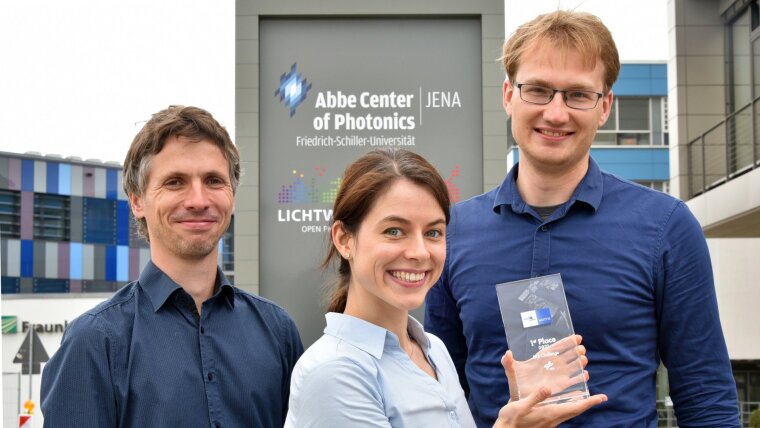
Published: | By: Vivien Busse
Source article
Secure communication is a hot topic worldwide and innovative quantum technologies could ensure enhanced security in the future.
A team led by Dr Tobias Vogl of Friedrich Schiller University Jena has been tackling this research topic. The team entered his project, “QuVeKS – Quantum Processors for encrypted communication with satellites” (QuVeKS – Quantenprozessoren für verschlüsselte Kommunikation mit Satelliten), in this year’s competition of the German Aerospace Center’s “INNOspace” initiative. The project won the “INNOspace Masters Award” of the “DLR Challenge”, which is worth 400,000 euros.
Quantum architecture on a chip
Quantum technologies offer great potential, making them a promising vision for the future. “The quantum systems researched so far are very application-specific. In many cases, they cannot be networked and are not compatible,” notes Tobias Vogl from the Institute of Applied Physics at the University of Jena, regarding the current state of development. For this reason, the physicist has been working on the application of quantum technologies since he started his doctoral thesis in 2016. Now the research team has made a decisive advance. Together with the CiS Forschungsinstitut für Mikrosensorik GmbH (CiS Research Institute for Microsensors Ltd.) in Erfurt, the researchers from Jena are working on a universally applicable quantum circuit. Their goal is to combine the complete architecture of quantum logic – consisting of quantum light sources, waveguide technology and quantum detectors – on a compact chip.
Great future potential and diverse applications
The scientists were able to convince the jury in the “DLR Challenge” of the great future potential of their project. The chip can be freely programmed and can thus be used for a wide variety of applications. “Such a quantum circuit can be used in quantum cryptography, for example, and thus make the encryption of communication better and more secure,” explains Vogl. This is because quantum states can neither be copied nor read out exactly, adds his colleague Dr Falk Eilenberger.
“In future, such a quantum circuit could be used for encrypted communication from and with satellites,” says Tobias Vogl, emphasising the increased performance that a quantum circuit offers. Citing another potential application, he adds that the chip can also be used as a physically secure random number generator.
In addition to Dr Tobias Vogl, the project team also includes Kim Lammers, Dr Falk Eilenberger and Prof. Stefan Nolte of the Institute of Applied Physics of Friedrich Schiller University and the Fraunhofer Institute for Applied Optics and Precision Engineering (IOF). The team is completed by Dr Martin Jahn and Dr Christian Möller of the CiS Forschungsinstitut für Mikrosensorik GmbH.
The research team will use the 400,000-euro prize money to develop their project further. In addition to the ongoing costs for research, positions for doctoral students will also be created. The award also confirms the recent decision to establish the “Quantum Hub Thuringia”, with the aim of developing the site into an important centre for quantum research and industry. “The strong network within Thuringia has contributed significantly to the success of the project,” says Vogl.
About the INNOspace Masters Award
The INNOspace Masters Award is presented annually by the INNOspace Initiative of the German Aerospace Center (DLR). The award recognises innovative ideas and concepts that improve technologies, processes and applications, based on knowledge and technology transfer through the exchange of knowledge between aerospace and other fields. This year, the Initiative was seeking topics relating to digital sustainability and security in space (such as secure communication services and protection against cyber-attacks), as well as approaches for saving resources in space and on Earth.